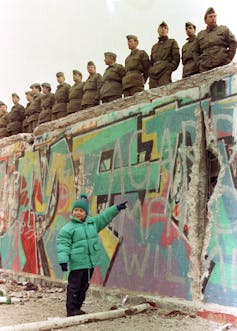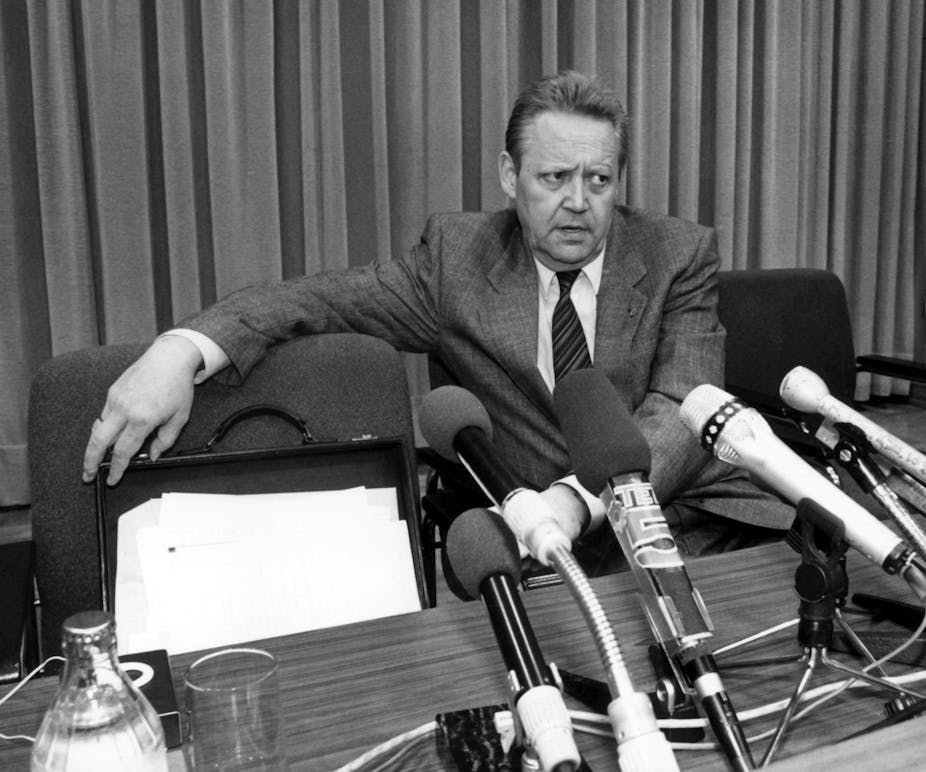The spectacle of thousands of East Germans flocking to the Berlin Wall and demanding its guards open the border crossings supplied some of the most remarkable images of our time. From the Monday demonstrations in Leipzig up to the huge rally on Alexanderplatz in East Berlin a few days before the Wall came down, the Germans helped bring down the communist GDR regime with banners and slogans such as “Wir sind das Volk” (“We are the people”).
But at the heart of it all was the press conference that took place on the evening of November 9, and the lead role in the drama went to Günter Schabowski, a high-ranking East German apparatchik who recently died at the age of 86 – and whose answers at the briefing have become the stuff of legend.
When asked when the new government decree allowing free travel would take effect, he responded “ab sofort, unverzüglich” (“from now, immediately”), three famous words that signalled to hundreds of East Berliners to run to the border checks and challenge the guards.
This pronouncement has long been written up as an offhand comment with outsize consequences. But the popular image of Schabowski as a bumbling idiot, out of his depth and slow to grasp the consequences of his actions, is wide of the mark.
No slip-up?
At the end of November 1989, once West German politicians – and Helmut Kohl in particular – took charge of the process, the breach of the Berlin Wall began to be recast as the beginning of German reunification. And Schabowski was quickly – and undeservedly – framed in the public imagination as a clueless accidental hero who inadvertently triggered one of the most spectacular sets of unintended consequences in recent history.

Yet Schabowski was also one of very few former communist functionaries of the entire bloc of former communist countries who expressed his guilt and regret for the failures of communist regime or apologised to its victims. Paradoxically, he was also one of the few East European communists who served his time in a jail.
Along with Egon Krenz and others, he had been instrumental in removing the old communist regime led by Erich Honecker. And after a new travel law was mooted on Monday 6 November 1989, decried as too timid at that day’s demonstration in Leipzig and getting plenty of coverage on West German TV news, Schabowski agreed with Krenz that the law should be approved through an expedited procedure, and permit both permanent and temporary departures from the country.
And after the coup against Honecker but before the the new travel law, Schabowski had met with West Berlin’s SPD mayor, Walter Momper, and told him that there would be a travel law worth its name – that is, genuine freedom of travel.
Mystery caller
In an interview I conducted with Schabowski in 2007, he claimed that the famous piece of paper given to him by Krenz, which he seemed to fish randomly out of a large pile of documents during the press conference, did not state clearly when the new travel rules were due to come into force, merely “ab sofort, unverzüglich”.
In contrast, Krenz always maintained that the misunderstanding was Schabowski’s fault, that he didn’t read carefully through the portfolio on his way to the press briefing and simply missed a press statement allowing the government decree to be made public as of 4am the next day.
But whether that is true or not, there are reasons to believe that Schabowski was not just fumbling his way through, and that he was in fact clearly aware of the significance of the paper from Krenz.
Schabowski left the announcement to the end of the press conference because it was a government matter, and he, as a Politburo member, held no official government post. As the conference wound down, he interrupted a reporter in the middle of his question to call on a journalist from the Italian news agency, Riccardo Ehrmann, who shifted the question-and-answer session to the issue of the new travel law.
Some 20 years after the events, Ehrmann admitted that he had received a mysterious phone call encouraging him to ask the question – though he did not want to say who he thought it might be from.
Schabowski’s real motivations on the night have of course gone to his grave with him. But at the very least, what little we know suggests that he may have been rather more in the loop than his image as a hapless bureaucrat would suggest.

